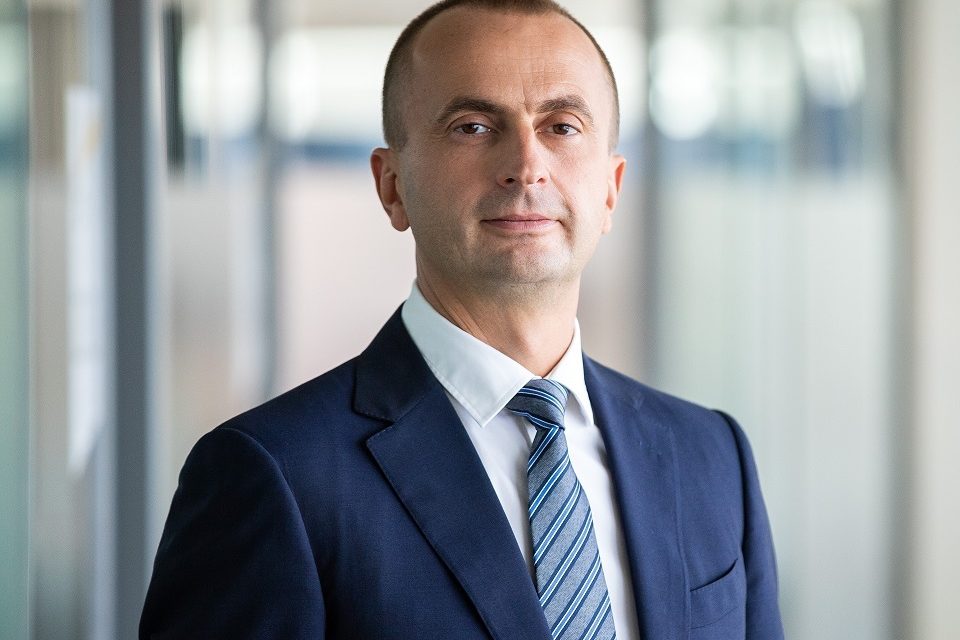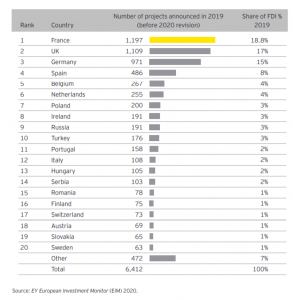EY survey: Businesses remain optimistic on foreign direct investment plans despite COVID-19 concerns

Analysis reveals that the COVID-19 pandemic disrupted many business plans leading to the delay or cancellation of 35% of 2019 foreign direct investment (FDI) projects into Europe, according to the 20th edition of EY Europe Attractiveness survey. This comes as analysis of 2019 projects highlights stronger YoY performance compared to the 2018 (0.9%, up from -4%)
Based on research conducted in April 2020, 49% of respondents believe Europe is at risk of becoming a less attractive investment destination amid concerns over future economic instability as a result of the pandemic. However, in the near-term, investors remain bullish, with 51% of business leaders expecting a minor decrease in the number of new projects initiated, while 11% of respondents expect no deviation from their plans in 2020.
Alongside this, 80% of leaders surveyed in April 2020 stated that government stimulus packages influence their investment decisions and will favor nations with stronger COVID-19 pandemic stimulus support measures in place.
“Europe can remain attractive to investment if it acts and responds decisively in three major directions: technology adoption, sustainability and supply chain shock resistance, as these will influence future investment decisions. It is important for Europe to remain a favorite destination for investment projects, and in this regard, it is vital that governments adopt a business-specific mindset, work towards innovation and create new strategies to attract foreign direct investment, not only to reduce unemployment but also to support balanced economic growth”, says Bogdan Ion, Country Managing Partner EY Romania & Moldova and Chief Operating Officer for EY South-East & Central Europe and Central Asia (CESA).
Mapping FDI
Data reveals that 52% of FDI projects between 2015-2019 originated from countries within Europe, demonstrating FDI from Europe can be an incredible economic and transformational force for Europe. Analysis of projects in 2019 found that seven of the top ten investor countries were within Europe. Almost a quarter (23%) of projects originated from the United States.
The analysis of FDI destinations found that in 2019 France saw the largest increase in new projects up 17% YoY, with 1,197 new projects – resulting in France overtaking the UK as the most attractive destination in Europe for the first time. Despite a drop-in the number of investment projects into Germany in 2018, analysis reveals that projects into the country remain level in 2019 (2019: 971 projects, 2018: 973 projects).
However, the United Kingdom remains attractive as investment increased by 5%, closely behind France with 1,109 projects in 2019. The UK growth aligns with a reduction of investors’ Brexit concerns, as just under a quarter (24%) of respondents (vs 38% in 2018) cite Brexit uncertainties as one of their top three risks to attractiveness across Europe.
The report highlights that sectors that require a specialized workforce, such as construction, saw projects rise by 158% in 2019 (209: 124 projects, 2018: 48 projects), while the Information, Communications and Media (ICM) sector also saw a significant increase in FDI projects by 117% (2019: 241 projects, 2018: 111 projects).
Despite strong performance in the textiles and clothing sector from Western Europe, FDI projects into central and eastern European countries fell, resulting in an overall sector decline of 22%. However, the survey found that almost four in ten (37%) businesses are considering an increase in their manufacturing presence in Europe.
While data suggests that projects within the digital sector have fallen slightly (-1% YoY), 55% of organizations surveyed plan to enhance their digital customer experiences and business-to-customer interactions, while 82% expect technology adoption to accelerate in the next three years – a direct result of the COVID-19 pandemic creating new challenges and opportunities for businesses.
FDI projects and job creation in Europe – a critical crossroad
Between 2003 and 2017, FDI projects accounted for over 11m new jobs within the European Union. However, due to the COVID-19 pandemic, the report reveals a potential decline of up to 50% in the number of new jobs created following the completion of FDI projects. To safeguard against such potential downturns, governments must adapt their education and training and development systems to help make sure it can offer a workforce with the right skills in the post-COVID-19 landscape.
Data suggests that the digital and business services sectors (including professional and legal services) generated almost a quarter of new jobs (24%) in 2019. Nations such as Ireland, Poland and Portugal, which attract FDI projects focused on service-orientated, software development and R&D, are likely to see new job creation rates remain high.
While the outbreak of COVID-19 is having an impact on numerous sectors and industries, the transportation sector (including automotive and aeronautic manufactures and suppliers) is facing the biggest risk. The sector accounted for 23% of new jobs in 2019 (down from 25% in 2018). Research shows this sector has experienced the greatest supply chain disruption and revenue losses, leading to a greater proportion of projects being delayed, downsized or cancelled than in other sectors.
 Supply chains, sustainability and the impact of COVID-19
Supply chains, sustainability and the impact of COVID-19
The disruption of supply chains as a result of the COVID-19 pandemic is widespread, but to recover operations and help ensure resiliency is built into future supply chains across Europe, respondents have plans to reconfigure them, with a new mix of reshoring, nearshoring and offshoring.
Many respondents believe COVID-19, the risk of future pandemics, climate change and an increase geopolitical tension will reinforce the need for agile, future-ready supply chains; with 83% of businesses expecting to see regionalized supply chains replace their existing global infrastructure.
Alongside the demand for regionalized supply chains, the COVID-19 pandemic has enhanced consumer awareness of and demand for sustainability, with almost six in ten respondents (57%) renewing their focus on climate change and sustainability within the next three years.
EY is one of the world’s leading professional services firms with 284,000 employees in more than 700 offices across 150 countries, and revenues of approx. $36.4 billion in the financial year that ended on 30 June 2019. Our network is the most integrated worldwide, and its resources help us provide our clients with services allowing them to take advantage of opportunities anywhere in the world.
With a presence in Romania ever since 1992, EY is the leading company on the market of professional services. Our more than 800 employees in Romania and Moldova provide seamless assurance, tax, transactions, and advisory services to clients ranging from multinationals to local companies. Our offices are based in Bucharest, Cluj-Napoca, Timisoara, Iasi and Chisinau. In 2014, EY Romania joined the only global competition dedicated to entrepreneurship, EY Entrepreneur Of The Year. The winner of the national award represents Romania at the world final taking place every year in June, at Monte Carlo. The title of World Entrepreneur Of The Year is awarded in the world final. For more information, please visit: www.ey.com
About the survey
EY attractiveness surveys analyses the attractiveness of a particular region or country as an investment destination. The surveys are designed to help businesses make investment decisions and governments remove barriers to growth. A two-step methodology analyses both the reality and perception of FDI in the country or region.
The evaluation of the reality of FDI in Europe is based on the EY European Investment Monitor (EIM), the proprietary EY database, produced in collaboration with OCO. The field research was conducted by the CSA Institute in January and February 2020, based on a representative panel of 504 international decision-makers. Data collected around the impact of COVID-19 on FDI in Europe was conducted by Euromoney in April 2020, based on a representative panel of 113 international decision makers and a series of webinars with 30 European investment promotion agencies (IPA’s). ey.com/attractiveness














